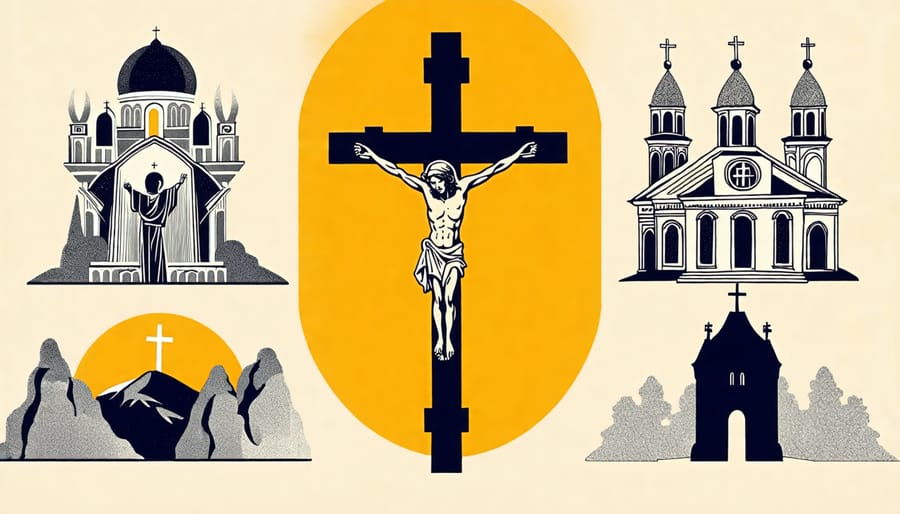Faith traditions are the rich tapestry that weaves together the diverse expressions of Christianity across time and cultures. While each tradition has its own unique history, practices, and emphases, they are all united by a common thread: a deep love for Jesus Christ and a commitment to following his teachings. Exploring the spectrum of faith traditions – from Eastern Orthodoxy to Evangelicalism, Catholicism to Pentecostalism – reveals both striking differences and profound similarities.
Despite their distinctives, all Christian traditions share core beliefs in the triune God, the divinity of Christ, the authority of Scripture, and the power of grace. Learning about other traditions can enrich our own faith, challenging us to see from new angles and appreciate the beauty in diversity. By approaching differences with humility, charity and a learner’s heart, we can build bridges of understanding.
Ultimately, faith traditions are not meant to divide, but to point us toward the God who unites. In studying them, may we grow not only in knowledge, but in love – love for God, for each other, and for the glorious kaleidoscope that is His Church. For a deeper dive, check out this Guide to Christian Traditions.

The Diversity of Christian Faith Traditions
Catholicism
The Catholic Church, with over 1.3 billion members worldwide, is the largest Christian denomination. Catholic faith traditions are rooted in the belief that the Church was founded by Jesus Christ and is guided by the Holy Spirit. The Pope, as the successor of Saint Peter, leads the hierarchy of bishops, priests, and deacons. Catholic liturgy centers around the seven sacraments, with the Eucharist as the central sacrament celebrated during Mass. Catholics also honor the Virgin Mary and the saints, and follow a liturgical calendar with holy days and feast days. Rich in history and tradition, Catholicism emphasizes the importance of sacred Scripture, sacred Tradition, and the Magisterium (teaching authority) of the Church.
Eastern Orthodoxy
The Eastern Orthodox Church, with its rich history and traditions, is one of the oldest branches of Christianity. Orthodox believers emphasize the importance of sacred iconography, viewing these images as windows into the divine realm. Icons are venerated and used as aids for prayer and contemplation. Eastern Orthodoxy also has a distinct theological perspective, stressing the mystery of God and the experiential nature of faith. The concept of theosis, or the process of becoming more like God through His grace, is central to Orthodox spirituality. Eastern Orthodoxy invites believers to engage with ancient traditions while cultivating a deep, transformative relationship with Christ.
Protestantism
The Protestant faith tradition encompasses a wide range of denominations, each with its own unique practices and interpretations of Scripture. Despite these differences, Protestants share a common emphasis on the authority of the Bible as the inspired word of God and the ultimate guide for Christian living. Protestants believe in the centrality of personal faith in Jesus Christ for salvation, often expressed through the doctrines of sola fide (faith alone) and sola scriptura (Scripture alone). This focus on individual relationships with God has led to a diversity of worship styles, from traditional liturgies to contemporary praise services, all aimed at glorifying God and nurturing spiritual growth within the community of believers.
The Role of Tradition in Faith
Faith traditions draw upon the rich heritage of Christian history, grounded in the teachings of the Bible. The biblical basis for tradition can be found in passages such as 2 Thessalonians 2:15, which encourages believers to “stand firm and hold to the traditions that you were taught by us, either by our spoken word or by our letter.” Tradition serves as a complement to Scripture, helping to interpret and apply its timeless truths in ever-changing contexts.
Traditions shape Christian identity by connecting believers to the larger story of God’s redemptive work throughout history. They provide a sense of belonging and continuity, reminding us that we are part of a diverse yet united family of faith. Traditions also guide Christian practice, offering time-honored ways to worship, pray, and live out our faith in community.
While traditions vary among denominations and cultures, they share a common purpose: to point us toward Christ and deepen our relationship with Him. By embracing the richness of our faith traditions, we can grow in our understanding of God’s love and grace, finding strength and inspiration for our own journeys of faith. As we honor the traditions that have shaped us, let us also seek to build bridges of understanding and respect with those whose traditions may differ from our own, remembering that we are all part of the one Body of Christ.
Learning from Other Traditions
As Christians, we have much to gain by humbly and respectfully learning from the rich tapestry of faith traditions within the body of Christ. While we may have differences in practices or emphases, we are united by our shared love for Jesus and commitment to His gospel. By approaching other traditions with an open and curious heart, we can glean valuable insights that deepen our own faith walk. Whether it’s the contemplative practices of Eastern Orthodoxy, the vibrant worship of Pentecostalism, or the rich liturgical heritage of Catholicism, each tradition offers unique expressions of devotion to Christ. As we learn from one another, let us focus on the core truths that bind us together, remembering that our ultimate goal is to glorify God and build His Kingdom. In doing so, we not only enrich our personal faith but also strengthen the unity of the global Church, connecting believers worldwide through the power of the Holy Spirit. May we approach this learning with humility, grace, and a sincere desire to grow closer to Christ and one another.

Celebrating Our Shared Faith in Christ
While faith traditions may differ in their specific practices and emphases, all Christians share a deep, abiding faith in Jesus Christ as Lord and Savior. This unity transcends denominational boundaries and cultural differences, binding believers together in a global family of faith. As the apostle Paul affirms, “There is one body and one Spirit, just as you were called to one hope when you were called; one Lord, one faith, one baptism; one God and Father of all, who is over all and through all and in all” (Ephesians 4:4-6).
By recognizing and celebrating our common faith in Christ, we can appreciate the beautiful diversity within the Christian community. Each tradition brings unique insights, experiences, and expressions of worship that enrich our collective understanding of God’s love and grace. As we engage in respectful dialogue and seek to learn from one another, we grow in our ability to extend the same love and grace to the world around us.
Ultimately, what unites us is far greater than what divides us. As followers of Christ, we are called to uphold the essentials of the Gospel message: the transformative power of God’s love, the redemptive work of Christ on the cross, and the ongoing presence of the Holy Spirit in the lives of believers. By focusing on these core truths and embodying them in our daily lives, we can experience the joy and strength that comes from being part of a global community of faith, united in our love for Christ and our commitment to sharing His love with others.
